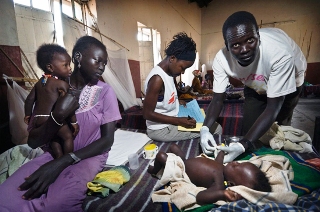MSF warns of dire situation for displaced in N. Bahr el Ghazal
February 4, 2015 (JUBA) – Thousands of people fleeing violence in the contested border area between the two Sudans desperately need food, water and medical care, Medicins San Frontiers (MSF) said.

According to local authorities, 1,542 households have arrived in Aweil North county of Northern Bahr el Ghazal since October. As the numbers increase, most of those arriving told MSF they fled from violence and militia attacks in the contested border region of Abyei.
“Some people have come from as far as Unity and Upper Nile states, where opposition forces have been clashing with South Sudanese government forces since the beginning of last year,” MSF said in a statement.
“They left with nothing and walked for weeks to reach this scorched corner of South Sudan, where they have settled in the already existing camps for internally displaced people (IDPs),” it stressed.
Abok Mawein who hails from Abiemnhom in Unity State told the international medical charity she lost her husband and children when the militia attacked her village, forcing her to flee for safety.
“They attacked in the night and I lost my children and husband in the chaos. Until now I don’t know if they are alive or not,” she said.
The food, water and healthcare needs are significant, MSF says, adding that many new arrivals only survived on water from hand-dug wells and almost all are forced to defecate in the open due to a lack of sanitation facilities.
MSF has reportedly launched an emergency intervention to assist the newly displaced population, providing medical services, and distributing essential items such as jerry cans to transport water, cooking pots, soap and blankets. Families with children between six months and five years, it stressed, also receive a food supplement to help stave off malnutrition.
“1,041 families have already benefited from these ongoing emergency distributions,” the agency said.
There are also concerns that lack of proper water and sanitation facilities could increase the risk of waterborne diseases.
“The humanitarian situation in Aweil North is already dire and access to healthcare is a chronic problem. Add thousands of newly displaced people and the situation will deteriorate even more,” said MSF project coordinator, Andrew Zadel.
Food scarcity, worsened by poor harvests, was also a major problem among the displaced population and in order to survive, people have reportedly been forced to gather wild tamarind fruits and the leaves of the Akuor tree for their food. Some reportedly collect desert dates, spending hours using sticks to crack open the fruit stones so the inner seed can be boiled and eaten, while others collect firewood and make grass mats to sell in the market in order to earn money to buy food.
“So far we are providing assistance in 10 of the 11 camps in Aweil North. We are planning to carry out more distributions of essential items in the newly established camp, but more assistance is urgently needed for this vulnerable population,” said Zadel.
“We are worried that the nutritional situation of these people will deteriorate in the coming months if significant assistance is not provided. We need other organisations here to help this neglected population,” he explained.
(ST)
